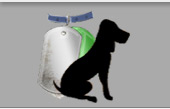 An
effective dog licensing regime should aim for good compliance.
An
effective dog licensing regime should aim for good compliance.
On this page are strategies customers have taught us over the years on how to lift and sustain compliance.
To begin, you need a good estimate on your current level of
compliance. The formula for compliance is
compliance % = (# pet dogs
licensed / # pet dogs) * 100
About the number of pet dogs licensed, you ought to be able to get a precise number. If you sell only annual licenses, the determination is trivial. If you sell licenses of differing terms -- for instance, you sell annual, three year, and lifetime licenses -- you need to sum the number of active licenses over all terms. The determination is easier if you use values as of the end of the prior year, rather than estimating from today's numbers.
For the number of pet dogs in your jurisdiction, you can derive an estimate based upon the average number of pet dogs per household, the average household size, and your population.
You can find an estimate of the average number of pet dogs per household nationally on the website of the American Veterinary Medicine Association. Their 2012 estimate is 0.584. For more precise numbers on your state or region, please visit their website.
For recent estimates on your population and average household size, visit the U.S. Census Bureau website. Their 2012 estimate of average household size nationally is 2.60.
Below is a calculator to estimate compliance. Try plugging in your numbers.
Strategy 1:
Get the word out.
Inform the general public of the importance of licensing by maintaining notices at shelters, vet clinics, and similar venues. During the licensing season, send releases to your local media to carry as public service announcements. Paid announcements may be useful, as well. Other traditional channels, such as mail, direct mail, automated calling, and billboards, can all be effective for getting the word out.
The overall message should emphasize the positive aspects of
licensing. Lower community rabies risk, if a rabies vaccination
is required for buying a license. Should your dog become lost, a
license is its ticket home. Fewer stray dogs. Fewer dogs euthanized. In most places,
licensing fees support the operations of the animal shelter
and animal control. If appealing to people's community sense and love of animals is
the carrot, the stick is that licensing is the law. You should
include mention of the fines, punishments, and other consequences
which could result from not licensing.
Strategy 2: Make it easy.
The less cumbersome it is to do, the more people will license. Mailing pre-filled applications to renewing owners can save them time and effort. Listing all the dogs of an owner on one page, instead of one application per dog, is less paperwork for them and you.
The use of technology has become the standard for today's
busy families. Allowing owners to renew and
purchase licenses online improves convenience and can
lift compliance.
Strategy 3: Support purchasing via outside agents.
Outside agents improve convenience. The agents can be vet clinics, libraries, and retail outlets. Particularly useful are humane societies, animal shelters, and pet stores, so that owners can register dogs at the time of purchase. Many places, in fact, make buying a license a requirement when buying a pet.
But managing outside agents is challenging. The process is usually paper-driven and prone to mistakes: missing or incorrect information on forms; arithmetic errors; wrongly assigned numbers. As agents remit to you long after transactions occur, getting things fixed can be difficult and time consuming.
For better management, first limit your
agents to those who have sold a lot for you in the past and
demonstrated good process control. Second, use an online
system for licensing in which outside agents have restricted
access. The system should enforce good process control by the
agents and permit you to manage and audit their activities.
Strategy 4: Account for all renewable licenses.
In any year, the majority of licenses bought are renewals. By the end of the licensing year, all renewable licenses should be accounted for. Do not let a renewable license simply drop off. You have an owner's contact and pet information. Stay after it until the status -- license renewed, pet died, or owner moved -- is determined. Accounting for renewable licenses is a cornerstone of effective compliance.
Communicating with renewing owners is the key. At the start of the
licensing year, target them directly via mail, email, automated
call, or some combination of the three. As the renewing deadline
nears, stay on them with a message of urgency that informs of
the penalties for not renewing. Mail, email, and automated calls
are effective here. When the deadline is passed, don't give up.
By now you might need more immediate communications to be
effective, such as personal calls, door hangers, or
in-person visits by animal control.
Strategy 5: Be pro-active about enforcement.
Canvassing for owners who have not renewed or for dogs that are not properly licensed is difficult, but it gets results.
Here are ways our system supports these compliance strategies,
- Makes managing licenses easy, accurate, and efficient.
- Makes license information readily available to support a wide variety of compliance-related activities.
- Identifies potentially duplicated accounts and has an account merging function. These capabilities help to maintain a clean database. Having a clean database saves money on printing and mailing renewal applications. It also makes your compliance efforts more effective as you do not waste time and money pursuing renewable licenses that have already been accounted for.
- Generates pre-filled applications for mass renewal mailings.
- Generates pre-filled applications on an ad-hoc basis for any owner at any time. One click gives you an application listing all unrenewed dogs for that owner.
- Supports fast, convenient, and user-friendly online purchasing and renewing.
- Supports a variety of search capabilities for fine-grained searching of owners and licenses.
- Generates a list of delinquent owners that can be filtered by city, street, zip. The list can even be ordered by the number of unrenewed pets per owner, so that you may target those first.
- Generates a list of delinquent owners ordered by street, then number on street, which makes canvassing more efficient.
- Produces text files of delinquent owners and unrenewed licenses for export to other systems.
- Notifies renewing owners with email reminders.
- Works great in smart phones and tablets, so that animal control can access the current license database in the field.
- Integrates Google maps into owner address listings for use by animal control.
For more ideas on compliance and how our service can help, please contact us.

